Exploring Bird Stores: Your Guide to Avian Companions
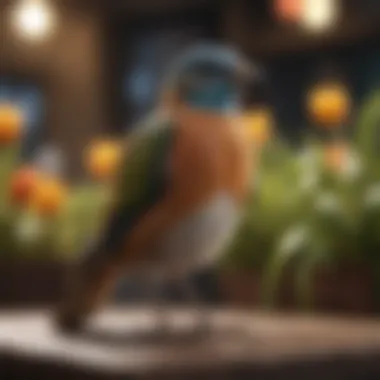
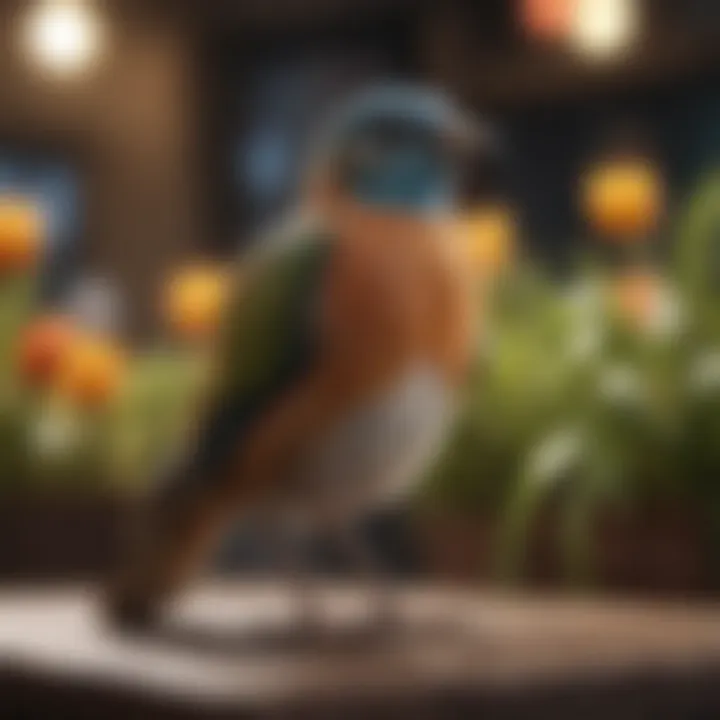
Intro
Exploring the world of bird ownership begins at the bird store. This journey is not just about choosing a feathered friend; it involves understanding the unique needs of various species, along with the intricate details of their care. For potential pet owners, this guide intends to provide insights and practical advice on finding the right avian companion. The right decision starts with a clear understanding of what it takes to welcome a bird into your life.
Understanding Your Pet
Pet Behavior Basics
To begin with, understanding your future pet's behavior is crucial. Birds are intelligent creatures that exhibit a range of behaviors influenced by their species, social interactions, and environments. Some might be more vocal, while others prefer quieter settings. Each bird has its personality, making it important for potential owners to observe and learn before making a choice. Every interaction in a store can help gauge how well a particular bird fits with your lifestyle.
Common Breed Characteristics
Each bird species comes with its own set of characteristics. For instance, parrots like the African Grey are known for their intelligence and ability to mimic human speech, while Budgerigars, or budgies, are smaller and often more social. Knowing a breed's characteristics can significantly influence the selection process. Different birds require different environments; for example, larger birds often need more space and enrichment than smaller varieties.
Species-Specific Needs
Understanding the specific needs of various species is paramount. Some birds may need particular diets, while others require a distinctive type of cage. For instance, Cockatiels enjoy social interaction and can thrive in interactive environments, while Lovebirds often require companions to maintain their mental health. Learning about these species-specific necessities ensures that new owners are adequately prepared to meet their pet’s requirements.
Pet Care and Maintenance
Feeding Guidelines
Proper nutrition is fundamental to a bird's well-being. Each species may have distinct dietary needs. For example, seed mixes are suitable for some small birds, whereas larger birds might require pellets or fresh fruits and vegetables as part of their diet. Consulting with specialists at the bird store can provide clarity on the best feeding practices tailored to your chosen pet.
Grooming Essentials
Grooming is another critical maintenance aspect of bird care. Birds need regular attention to their feathers and beaks. Tools like nail clippers and specialized bird baths can enhance their grooming. Additionally, establishing a grooming routine instills comfort and familiarity with handling, which is essential for building a trusting relationship with your pet.
Hygiene Practices
Maintaining hygiene is vital in the care of pet birds. Regular cleaning of the cage, toys, and feeding areas prevents the build-up of dirt and bacteria. It's advisable to use bird-safe cleaning supplies to ensure the health and safety of your pet. Owners should establish a regular cleaning schedule that suits their lifestyle, ensuring their bird’s environment remains healthy.
Training and Development
Basic Commands and Skills
Training your bird should commence shortly after adoption. Basic commands like “step up” or “stay” can foster good behavior and strengthen the bond between the owner and pet. Using positive reinforcement techniques, such as treats, aids in effective training and helps birds associate commands with rewards.
Behavioral Training Techniques
Understanding and correcting unwanted behaviors are also essential. Birds can display behaviors such as screaming or feather plucking due to stress or boredom. Identifying these issues allows owners to implement training methods aimed at reducing stress. Engaging birds in toys or social interaction helps alleviate negative behaviors.
Addressing Common Behavior Issues
It is equally crucial to recognize and address common behavior issues early on. Birds communicate in various ways, and understanding the nuances of their vocalizations and body language can prevent misunderstandings. For example, a bird that is fluffing its feathers could indicate discomfort or illness, necessitating a closer look.
Health and Wellness
Routine Vet Check-ups
Routine veterinary check-ups are significant for maintaining avian health. Regular visits can help detect health problems early. A specialized avian vet can provide insights into maintaining a bird's health through nutrition and preventive care.
Vaccination Needs
Vaccination is another critical aspect of avian health. Different species may have specific vaccination requirements. A vet will guide owners on the essential vaccinations to keep their birds healthy and protected from common avian diseases.
Recognizing Signs of Illness
It is vital to recognize signs of potential illness in birds. Changes in behavior, such as decreased activity or changes in droppings, can indicate health issues. Owners should remain vigilant about their pet's behavior, as early detection often leads to better treatment outcomes.
Enrichment and Activities
Indoor vs.
Outdoor Activities
Birds require mental and physical stimulation through various activities. Deciding between indoor and outdoor activities is essential. Indoor play areas with perches and toys allow safe playtime, while outdoor aviaries need secure fencing to protect birds from hazards.
Interactive Toys and Games
Investing in interactive toys can make a significant difference. Toys that stimulate a bird’s mind, such as puzzles or foraging toys, keep them engaged. Regularly changing toys can further sustain interest and challenge.
Socialization Opportunities
Socialization is essential for healthy bird behavior. Birds thrive on interaction with both humans and other birds. Creating an environment where socialization is encouraged assists in developing a well-adapted and sociable pet.


Choosing the right pet bird depends greatly on understanding their unique traits and needs. This understanding is pivotal for a successful and fulfilling avian companion experience.
Understanding Bird Stores
Understanding bird stores is crucial for anyone considering adding an avian companion to their home. Bird stores offer a unique environment focused on the needs of birds and their potential owners. This understanding helps to navigate the various types of stores and the species they provide, which is essential when deciding on the right pet for your lifestyle.
Definition of Bird Stores
Bird stores are specialized retail outlets that focus primarily on avian species and their related care products. They differ from regular pet shops in that they provide a curated selection of birds, cages, food, and accessories specifically designed for birds. These stores often cater to specific species, providing owners with the resources necessary for responsible pet ownership.
Types of Bird Stores
Independent Pet Stores
Independent pet stores generally operate on a smaller scale. Their intimate size allows for a personalized shopping experience. These stores often focus on providing quality care for animals and fostering relationships between staff and customers. A key characteristic of independent pet stores is their commitment to sourcing birds from reputable breeders, which can ensure healthier birds.
However, these stores might have limited stock compared to larger retailers. Still, their knowledge and specialized products resonate well with aspiring bird owners seeking expert advice and high-quality supplies without the impersonal nature of larger establishments.
Chain Retailers
Chain retailers, such as Petco or PetSmart, offer a wide variety of birds and accessories across multiple locations. These stores usually benefit from economies of scale, which allows them to offer competitive pricing. A notable feature of chain retailers is their extensive marketing efforts, making them well-known and easily accessible resources for prospective bird owners.
Despite their advantages, chain retailers may lack the specialized knowledge that independent stores provide. Staff may not be as well-trained regarding the care and needs of specific bird species. This factor can affect the overall buying experience for individuals looking for tailored information on avian care.
Specialty Bird Stores
Specialty bird stores focus exclusively on avian species and their needs. These locations are often staffed by passionate bird enthusiasts with extensive knowledge about various species. Their dedication makes specialty bird stores a popular choice for bird owners seeking specific insights and unique products.
A significant advantage of specialty bird stores is the extensive selection of products tailored to birds, including nutritional foods, toys, and cages. However, their niche focus may lead to higher prices compared to larger retailers, making it crucial for buyers to evaluate the overall value of educated advice and quality products when shopping here.
Common Species Available
Parakeets
Parakeets are small, colorful birds that make excellent companions for first-time owners. Their friendly demeanor and ease of care have made them increasingly popular. These birds enjoy social interaction and can be trained to perform various tricks. However, their small size means they require careful handling to ensure safety.
Canaries
Canaries are known for their beautiful singing, making them a beloved choice for many bird owners. They are relatively easy to care for, requiring a simple diet and a spacious cage. These birds are generally solitary and prefer their own company, meaning they do not usually require a companion.
Finches
Finches are small, lively birds that thrive in groups. Their social nature makes them ideal for owners interested in keeping multiple birds. They require a balanced diet and an enriched environment for exercise but can be easy to care for overall.
Parrots
Parrots, including species like budgerigars or African greys, are known for their intelligence and sociable personality. While they require a significant commitment in terms of time and care, their ability to communicate and bond with humans can be incredibly rewarding. Parrots typically require larger living spaces and more elaborate stimulation to stay healthy and happy.
Why Choose a Local Bird Store
When considering the acquisition of an avian companion, the choice of where to purchase your bird is vital. Opting for a local bird store instead of a larger national chain brings several advantages that can enhance the experience of both the bird and the owner. A local store typically offers personalized service, expert knowledge, and a commitment to the health and welfare of their birds. These factors align with fostering a deeper connection between you and your future pet.
Supporting Local Business
Supporting local businesses has many benefits, not only for the economy but also for the community. Local bird stores often prioritize quality over quantity. Their selection usually includes healthy birds, sourced responsibly, and often hand-raised. This is crucial, as it directly affects the well-being of the birds available for adoption. Furthermore, when you buy from a local bird store, you are contributing to your community’s growth. The finances circulate within the local economy, promoting sustainability and development.
In addition to economic benefits, local stores tend to offer a more personal touch. You can build a relationship with the owners and staff. They often remember customers and their needs, providing tailored recommendations that cater to your requirements and preferences. This connection could lead to better service and support in the long run.
Expertise and Care
One significant advantage of local bird stores over larger retailers is their expertise and genuine care for the birds. Staff often consist of passionate individuals who have hands-on experience with various bird species. They can offer insights into care, grooming, and feeding specific to each species, unlike big box stores where employees may lack detailed knowledge. Furthermore, these independent stores are more likely to prioritize the birds' health before profit
A well-informed staff member can assist you in understanding the nuances of bird behavior, specific needs, and health issues that may arise. They often provide critical information on socialization and habitat requirements tailored to the species you plan to adopt.
Community Engagement
Local bird stores are often deeply embedded in their communities. They may host events like bird care workshops or social gatherings for bird enthusiasts. This engagement not only allows for networking among like-minded pet owners but also fosters a shared sense of responsibility toward bird welfare. In many cases, store owners partner with local veterinarians for health checks and advice, ensuring that the birds remain healthy and well cared for.
Additionally, many local shops contribute to conservation efforts. They might collaborate with avian rescue organizations or participate in fundraising initiatives. Supporting such establishments often means you are also supporting ethical practices in pet ownership. This can enrich your experience as an owner, knowing that you are part of a larger movement aimed at promoting bird welfare.
"Choosing a local bird store not only benefits you and your bird; it strengthens the community as a whole."
Factors to Consider When Choosing a Bird Store
Selecting the right bird store is crucial in ensuring that you find a healthy and happy avian companion. This section delves into vital factors that potential bird owners should prioritize. Each consideration can significantly impact both the initial bird selection and the long-term relationship with your bird. Knowing what to look for allows bird owners to make informed choices, enhancing the chances of a fulfilling bird ownership experience.
Health Guarantees
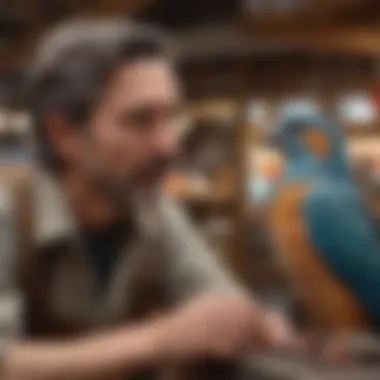
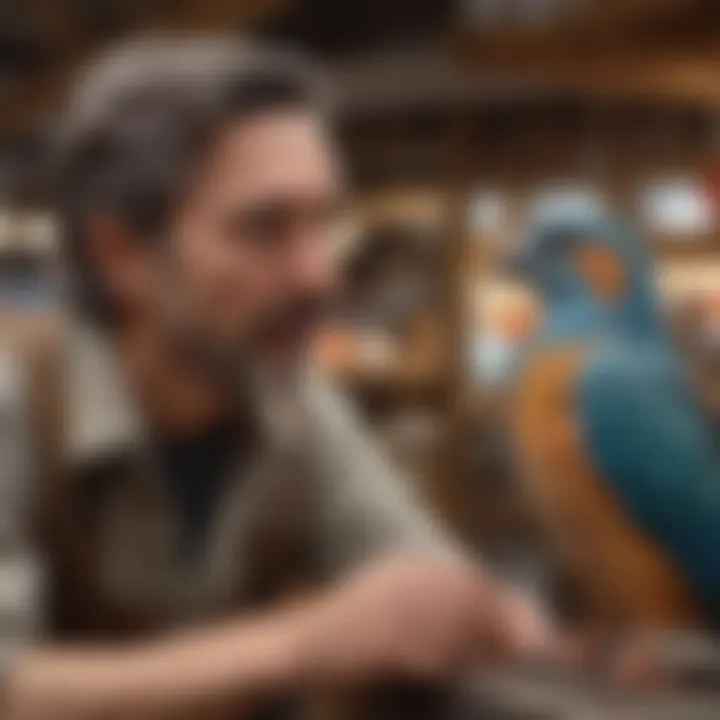
When choosing a bird store, ensuring health guarantees is extremely important. A responsible store will provide clear health guarantees for the birds they sell. This information covers many aspects, including the bird's age, vaccination status, and general health at purchase.
By seeking stores that offer these guarantees, you safeguard yourself from unexpected future health issues. It is crucial to read these guarantees thoroughly. Some stores may only provide a short health guarantee, while others offer longer periods or specific details on the care provided. This suggests confidence in the birds they offer. Always ask for documentation regarding these health guarantees. This step reassures you that the store prioritizes the well-being of their birds.
Customer Service
Customer service is another key element to look for in a bird store. The staff should exhibit knowledge about various bird species, their needs, and care. Engage with employees to assess their readiness to provide information. They should be willing to answer questions, offer guidance on bird care, and provide advice about specific breeds. A knowledgeable and approachable staff can greatly enhance your shopping experience.
Poor customer service can lead to misinformation about bird care, resulting in potential harm to the bird. Therefore, take time to evaluate how you are treated. If the staff seems uninterested, it may indicate a lack of commitment to pet care.
Take note of your interactions. The best stores will not only provide a pleasant experience but will also express genuine enthusiasm about helping you find the right bird. Their expertise can make a significant difference in your preparation for bird ownership.
Store Environment
Lastly, consider the store environment. A clean, organized, and well-maintained store reflects its commitment to the welfare of the birds it houses. Inspect the cages, as conditions should be spacious and hygienic. Birds need room to move around, and their living conditions should be free of clutter and waste.
The store environment extends beyond just cleanliness. An inviting atmosphere where birds appear healthy and active is a good sign. If the birds look stressed or lethargic, that may signal poor care.
Additionally, ensure the store has an adequate selection of accessories and supplies. Availability of proper equipment, food, and toys is vital. A comprehensive store suggests a commitment to meeting the needs of both birds and their owners.
In summary, focusing on health guarantees, customer service, and store environment simplifies finding the right bird store. Each aspect influences the bond you will form with your future pet. Prioritize these factors to select a store dedicated to enhancing both your experience and that of your avian companion.
Preparing for Your Visit to a Bird Store
Preparing for a visit to a bird store is a crucial step in the journey of bird ownership. Proper preparation ensures that potential bird owners are not only informed but also make choices that are well-suited to their lifestyle and expectations. Knowledge is empowering, and understanding what to look for can significantly contribute to the long-term wellbeing of the chosen avian companion.
Research Ahead of Time
Prior to stepping foot in a bird store, it is wise to conduct sufficient research. This involves gathering information about various types of birds, their specific needs, and overall care requirements. Each bird species has unique traits, making it essential to learn about social habits, dietary preferences, and space necessities.
When researching, consider the following aspects:
- Species Characteristics: Investigate the temperament and socialization needs of the bird species you are interested in. For example, parrots often require more interactive engagement compared to canaries.
- Lifespan Considerations: Understanding the lifespan of the bird species can help align your expectations with your long-term commitment.
- Care Requirements: Look into the health and diet needs of potential birds. Some species need specialized diets or specific environments to thrive.
A well-informed owner is more likely to create a suitable environment for their new pet.
Questions to Ask Staff
Once in the store, asking the right questions is paramount to ensure that you are making an informed decision. Knowledgeable staff can provide insights that may not be immediately evident. Here are some useful questions to consider:
- What is the age of this bird? Knowing the age helps in gauging its behavior and care requirements.
- Has this bird been socialized? This question helps to assess the readiness of the bird for interaction with humans.
- What is the bird’s diet? Understanding the specific dietary needs is crucial for maintaining the bird’s health.
- Are there any known health issues? Inquiring about health guarantees can reveal the care and standards upheld by the store.
Engaging with staff can lead to better choices and ultimately a more harmonious relationship with your bird.
Items to Bring
Preparation also includes having the right items on hand during your visit. Bringing a few essential items can aid in the selection process and ensure a smooth transition home. Consider taking:
- Notebook and Pen: To jot down observations or other relevant details during your visit.
- Camera or Smartphone: For taking pictures of potential birds, which can be helpful for later reference when making a decision.
- List of Must-Have Features: A clear list of what you’re looking for in a bird, such as size, personality traits, and required care can guide your search.
- Comfortable Clothing: Ensuring you are comfortable will allow you to be focused on the experience rather than your surroundings.
Overall, thorough preparation leads to a more informed and confident first experience in selecting an avian companion.
What to Expect Upon Arrival
Upon arriving at a bird store, there is an array of experiences awaiting you. Understanding what is ahead can greatly enhance your visit. This section clarifies the aspects of entry, interactions, and evaluations of the avian inhabitants.
A Walkthrough of the Store
As you enter the store, take a moment to absorb the surroundings. Each section typically showcases different types of birds, designed neatly for easy navigation. You will notice areas dedicated to social birds, small finches, and larger species like parrots. Observing the layout helps in understanding which birds you might be interested in engaging with. Store staff often greet you warmly and are ready to assist. Their guidance can direct you to locations that feature the species you are most drawn to.
You should look for cleanliness and organization within the store. A well-kept environment indicates the overall health and welfare of the birds. Remember, the way a store presents its products reflects how they prioritize the animals under their care.
Interacting with Birds
Interactivity is one of the most fulfilling aspects of a visit to a bird store. Each species has distinct personalities and varying levels of openness. Some birds, such as parakeets, enjoy contact and interaction, while others may prefer to observe from a distance. It is prudent to approach each bird gently and respectfully.
When interacting, watch for signs of comfort or stress. A relaxed bird will often exhibit behaviors such as fluffed feathers or playful movements. On the contrary, cowering or frantic movements may signal discomfort. Pay attention to how the store staff manages interactions; they can provide valuable tips on safe and enjoyable ways to engage with different bird species.
Assessing Bird Health and Behavior
Evaluating the health and behavior of birds in a store is essential. Start by observing their physical appearance. Healthy birds should have bright eyes, smooth feathers, and an active disposition. Unusual behaviors such as excessive preening or lethargy can indicate potential health issues.
You should feel encouraged to inquire about care routines implemented in the store. Staff should provide clear responses about daily diets, socialization practices, and health check protocols. A reputable store will offer transparency regarding their avian inhabitants. Engaging in these discussions not only enhances your knowledge but can also aid in making the best selection when considering a new companion.
Key Takeaway: Understanding what to expect upon arrival at a bird store creates a more enriching experience. Observing the environment, interacting compassionately, and assessing health properly will lead to informed decisions and better suitability for your future companion.
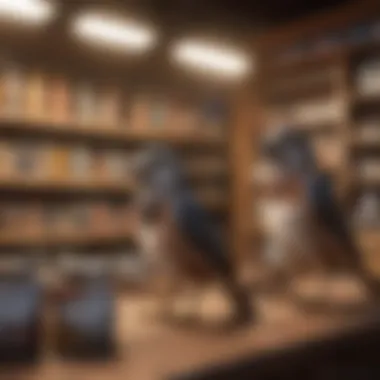
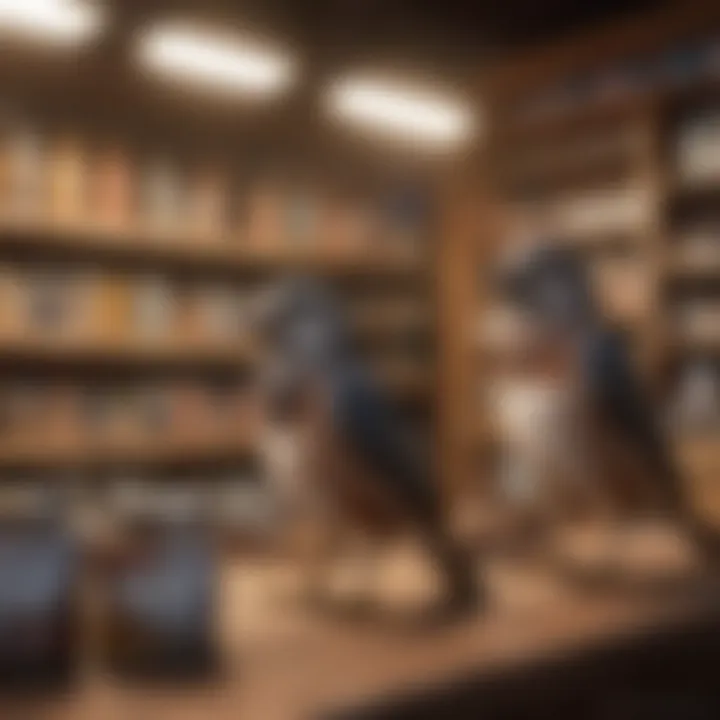
Post-Purchase Considerations
After selecting a bird from a store, it’s crucial to navigate the post-purchase phase with care and understanding. The decisions made during this period significantly impact the bird's wellbeing and the relationship between the bird and the owner. This section outlines vital aspects to consider after bringing a new avian companion home.
Acclimatization into Home
Acclimatization is a critical first step when introducing a bird to a new environment. Birds are sensitive to changes, and sudden shifts in their surroundings can cause stress.
- Safe Space: Designate a quiet area in your home away from pets or noisy distractions. Allow the bird to explore this new space at its own pace.
- Gradual Introduction: Initially, limit interaction. Observe the bird's behavior to understand its comfort level. Gradually increase socialization as the bird becomes more at ease.
- Familiar Objects: Include familiar toys or blankets from the store. This can help reduce anxiety by providing a sense of continuity.
Establishing a routine during this acclimatization period is equally important. Regular feeding times and consistent interaction will help the bird feel secure in its new home.
Setting Up the Bird's Habitat
Creating an appropriate habitat is essential for the overall health and happiness of the bird. An ideal environment caters to the specific species needs and provides ample stimulation. Here are essential elements to include:
- Cage Size: Ensure the cage is spacious enough for the bird to move freely. The dimensions depend on the bird species, but larger cages provide better comfort.
- Perches and Toys: Incorporate various perches, ideally of different materials and diameters. Toys that encourage mental stimulation are vital. Rotating them frequently keeps the environment engaging for the bird.
- Food and Water Stations: Provide clean food and water at all times. Use appropriate dishes and ensure they are easy to clean. Research the dietary needs of the specific bird species to offer a balanced diet.
- Environmental Enrichment: Introduce items like swings, climbing structures, or foraging toys. These encourage exploration and reduce boredom.
Setting up the habitat thoughtfully fosters a safe space where the bird can thrive.
Establishing Routine Care
Routine care is fundamental for the long-term health of your bird. Consistent practices help create a bond and establish a natural rhythm between the bird and owner. Consider the following aspects:
- Daily Interaction: Allocate time every day for interaction, which can include talking, playing, or simply being near the cage. This establishes trust and comfort.
- Grooming Needs: Regularly check feathers and nails. Depending on the bird species, some may require beak trimming or bathing. Research species-specific grooming requirements to ensure proper care.
- Health Monitoring: Watch for any signs of illness or stress. Changes in behavior, appetite, or droppings can signal health issues. Regular vet check-ups are also vital in maintaining your bird's health.
- Feeding Schedule: Implement a feeding routine to encourage stability in their daily life. Birds thrive in consistent environments, and a stable diet contributes to their wellbeing.
Establishing a strong routine not only benefits your bird but enhances your relationship, making it a fulfilling experience for both owner and pet.
Adhering to these post-purchase considerations lays a foundation for a happy and healthy life for both the bird and the owner. Care and attention during this phase can significantly enrich the bond formed.
The Relationship Between Owners and Birds
Establishing a strong connection between bird owners and their feathered companions is crucial. This relationship not only enhances the quality of life for the bird but also enriches the owner's experience. Understanding the specific elements that contribute to this bond is essential for responsible pet ownership. There are several benefits to cultivating a healthy relationship with birds. This includes promoting mental health for both parties and ensuring the bird feels secure in its environment. Effective social interaction can lead to more enjoyable and harmonious living arrangements.
Socialization Needs
Birds, unlike many other pets, have distinct socialization needs. They are inherently social creatures, requiring ample interaction with their human companions. Early socialization is vital, particularly for young birds, as it helps them become well-adjusted adults. This can be achieved through regular handling and gentle exposure to various stimuli within the home.
It’s important for owners to understand that neglecting a bird's social needs can lead to behavioral issues. Birds might develop anxiety, become aggressive, or even engage in destructive behaviors. Providing toys and opportunities for playtime can significantly enhance their social experience. A well-socialized bird tends to be more confident and less fearful of new experiences, contributing to a positive overall atmosphere in the home.
Understanding Bird Behavior
To effectively nurture a bird-owner relationship, understanding bird behavior is essential. Birds exhibit a range of behaviors that can often be misunderstood by their human counterparts. Recognizing signs of stress or happiness is key. For example, tail feathers fluffed up can indicate comfort, while aggressive posturing may suggest fear or aggression.
Educating oneself about species-specific behaviors can provide insight into what motivates a bird and how to distinguish between normal and abnormal patterns. This foundational knowledge fosters better interactions, ensuring that birds feel safe and understood. Engaging in observation can reveal much about their preferences, dislikes, and unique personalities, thereby promoting a tailored approach to care that enriches the relationship.
Communication Between Species
Communication between humans and birds can often seem challenging. However, establishing clear channels of communication is crucial for a harmonious relationship. Birds communicate through vocalizations, body language, and other behaviors. Understanding these signals can significantly enhance interaction quality.
Owners should take time to learn what different sounds mean – from chirps indicating happiness to squawks suggesting distress. Additionally, body position often conveys messages; for instance, a bird's posture can express readiness to engage or a desire to retreat.
By actively observing and responding to these signals, owners can improve their bonding experience with their birds. This reciprocal communication builds trust and understanding, allowing both species to coexist more peacefully.
The key to a fulfilling relationship between owners and birds lies in understanding, communication, and regular interaction.
Balancing social needs, comprehending behavior, and fostering effective communication will go a long way in nurturing fulfilling relationships with avian companions.
Resources for Bird Owners
When welcoming a bird into your home, having access to the right resources becomes essential. The acquisition of knowledge about proper care and socialization greatly influences the well-being of your avian companion. Resources for bird owners not only provide essential information but also foster a sense of community among bird enthusiasts. By utilizing these resources, prospective and current bird owners can make informed decisions, ensuring a rewarding experience with their feathered friends.
Available Literature
The world of avian literature is vast. Books focusing on bird care, behavior, and training can offer invaluable insights. Consider exploring titles such as The Bird Care Book and The Parrot Handbook, which provide comprehensive guides on diet, habitat setup, and behavioral understanding. Additionally, scholarly articles from databases like britannica.com can shed light on various species and their specific needs.
Bird care manuals often include practical advice on nurturing your bird’s physical and mental health, while species-specific guides will cover the unique traits and requirements of birds like cockatiels and lovebirds. It's important to seek out current editions to ensure you are getting the most reliable and up-to-date information.
Online Communities
In today’s digital age, the internet serves as a rich source of knowledge and support for bird owners. Websites such as reddit.com offer forums where bird enthusiasts gather to share experiences, answer questions, and provide tips. Communities on social media platforms like Facebook can also connect you with local bird groups, fostering a sense of belonging.
Joining an online community allows you to learn from others who have gone through similar experiences. You can gain perspectives on topics ranging from bird diseases to diet preferences. Furthermore, these platforms often facilitate discussions on training techniques and behavioral issues.
Professional Guidance
Seeking professional guidance is essential, particularly when navigating complex issues related to your bird's health and behavior. Consulting an avian veterinarian ensures that you receive expert advice tailored specifically to your bird's species. They can offer guidance on nutrition, preventative care, and identify any signs of illness early.
Additionally, workshops and seminars hosted by bird organizations or pet expos can provide hands-on learning and networking opportunities. Engaging with skilled trainers can enhance your bird's sociability and communication skills, ultimately leading to a healthier, more harmonious relationship.
The knowledge you gain from literature, online communities, and professional sources is invaluable for ensuring the health and happiness of your avian companion.
Taking the time to explore these resources will equip you with the tools necessary to create a nurturing environment for your pet bird.







